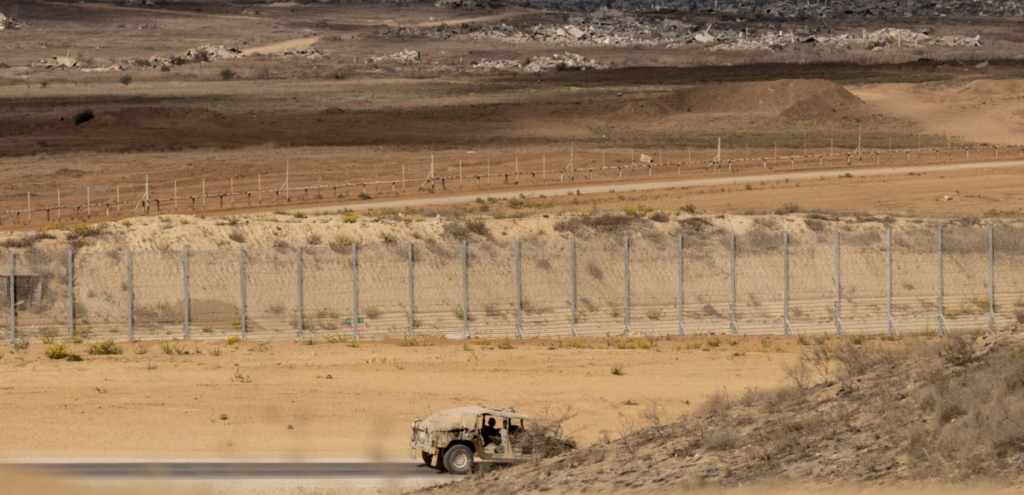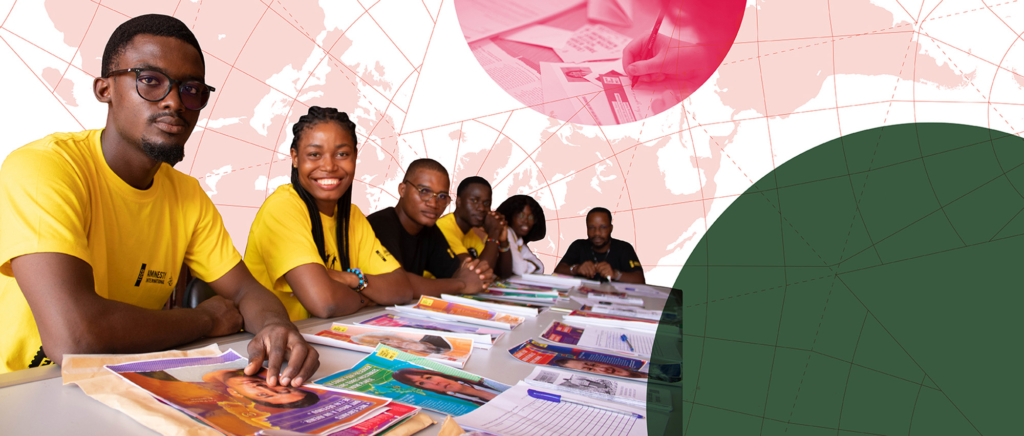Work on Maher Arar’s case has been one of our most intensive campaigns for justice spanning well over a decade. Here are some of the highlights:
26 Sept 2002: Canadian Maher Arar is detained at JFK Airport by US authorities while en route to Canada from Tunisia. Shortly afterwards, Maher’s wife Monia Mazigh contacts Amnesty Canada’s Secretary General Alex Neve.
17 October 2002: Canadian Foreign Affairs Minister Bill Graham reports that US officials told him Maher Arar had been deported to Syria. Neither US nor Syrian officials will confirm what has happened.
21 October 2002: Amnesty issues the first of a series of Urgent Actions on the case raising concerns around the disappearance of Maher Arar.
23 October 2002: Amnesty Canada writes to then Prime Minister Jean Chretien about Canadian citizens detained by US officials since September 11th one of which is Maher Arar.
25 October 2002: Acting on reliable information that Maher Arar is detained in an unknown location in Syria, Amnesty issues a follow-up Urgent Action about the significant risk of torture.
12 December 2002: Amnesty Canada writes to Foreign Affairs Minister Bill Graham calling for stronger interventions with Syrian and US officials.
10 February 2003: With Maher Arar’s location still undisclosed, Amnesty issues a follow-up Urgent Action reiterating concerns around disappearance and torture.
14 March 2003: Amnesty issues yet another follow-up Urgent Action with additional concerns about ongoing detention without trial.
9 May 2003: Amnesty Canada issues an open letter to Foreign Affairs Minister Bill Graham calling again for greater action following the visit of two Canadian parliamentarians to Syria during which they met with Maher Arar in detention.
13 June 2003: Amnesty Canada writes to then Deputy Prime Minister John Manley calling on him to press US officials for an explanation of the extraordinary rendition of Maher Arar to Syria via Jordan.
4 July 2003: Amnesty Canada organizes a joint letter signed by over 40 organizations and unions to then US Ambassador Paul Cellucci.
8 and 18 August 2003: Amnesty issues follow up Urgent Actions on fear of torture, prolonged detention without trial and incommunicado detention.
11 September 2003: Former Canadian Minister of External Affairs Flora MacDonald, Monia Mazigh and Amnesty Canada Secretary General Alex Neve march on the US Embassy in Ottawa and seek a meeting with the Ambassador. US officials refuse admission to Monia Mazigh. Flora MacDonald and Alex Neve meet with the Deputy Ambassador and press US officials to intervene with the Syrian government to secure Maher Arar’s release.
18 September 2003: Amnesty Canada writes to Prime Minister Jean Chretien about the looming prospect of an unfair trial.
26 September 2003: Amnesty Canada activists join Monia Mazigh, her children, her mother and Maher Arar’s mother in a procession carrying a large mock-up of Maher Arar’s Canadian passport, beginning at the US Embassy and then on to the Prime Minister’s Office and the Syrian Embassy, demanding justice for Maher Arar.
5 October 2003: Maher Arar is released from detention in Syria.
6 October 2003: Maher Arar flies home to Canada and makes a brief press statement together with Amnesty Canada Secretary General Alex Neve.
7 October 2003: Amnesty issues a follow-up Urgent Action calling on Syrian authorities to conduct an independent and thorough investigation into the circumstances surrounding the arrest of Maher Arar and into the reports that he was tortured and ill-treated.
9 October 2003: Amnesty Canada launches a national campaign for a Public Inquiry into the role of Canadian officials in the case of Maher Arar.
4 November 2003: Amnesty Canada Secretary General joins Maher Arar for a widely covered national press conference at which time he details for the first time what had happened to him following his arrest by US officials in September 2002, including a description of the torture he was subjected to in Syria and troubling questions about the possible role of Canadian officials.
14 November 2003: Amnesty calls on the US Attorney General to conduct a full investigation into the treatment of Maher Arar.
5 February 2004: The Canadian government establishes the “Commission of Inquiry into the Actions of Canadian Officials in Relation to Maher Arar”. Amnesty Canada is granted Intervenor status and makes multiple submissions on the application of international human rights standards, procedure and recommendations for oversight. Throughout the years of proceedings, Amnesty Canada plays a lead role in pressing for an effective Inquiry and further examination of an emerging pattern of concerns around three related cases of Canadian men detained in Syria around the same time as Maher Arar.
7 June 2005: Amnesty Canada writes to Prime Minister Paul Martin urging that he appoint an Independent Expert to carry out a detailed review of Canadian complicity in the cases of Abdullah Almalki, Ahmad Abou-Elmaati and Muayyed Nureddin.
18 September 2006: The first report of the Arar Inquiry is released (Factual Inquiry). The Commissioner concluded “categorically that there is no evidence to indicate that Mr. Arar has committed any offence or that his activities constitute a threat to the security of Canada.”
12 December 2006: The second report of the Arar Inquiry is released (Policy Review), making extensive recommendations for review of the Royal Canadian Mounted Police’s (RCMP) national security activities as well as those of other federal departments and agencies.
December 2006: The Canadian government establishes an Internal Inquiry in the cases of Abdullah Almalki, Ahmad Abou-Elmaati and Muayyed Nureddin. Amnesty Canada played a key role in bringing to light the wider and troubling pattern of human rights violations involving these three men.
26 January 2007: The Canadian government officially apologizes to Maher Arar and pays over $10 million in compensation.
4 October 2007: Amnesty Canada writes an open letter to Prime Minister Stephen Harper expressing concern that the Internal Inquiry into the cases of Abdullah Almalki, Ahmad Abou-Elmaati and Muayyed Nureddin has been both deeply unfair to the three men and lacks transparency.
21 October 2008: The report of the Internal Inquiry into the cases of Abdullah Almalki, Ahmad Abou-Elmaati and Muayyed Nureddin is released. Justice Iacobucci unequivocally found that the three men were tortured and documented the many ways that “deficient” conduct by Canadian officials contributed to the grave human rights violations the men experienced.
27 October 2008: Amnesty Canada writes an open letter to Prime Minister Stephen Harper calling for action to address the concerns and recommendations of both Inquiries and urging redress similar to that received by Maher Arar.
November 2008: Amnesty Canada launches a public campaign calling for redress, accountability and reforms in the aftermath of the Internal Inquiry into the cases of Abdullah Almalki, Ahmad Abou-Elmaati and Muayyed Nureddin.
25 November 2008: Amnesty Canada calls on the House of Commons Standing Committee on Public Safety and the House of Commons Standing Committee on Foreign Affairs and International Trade to take up the reports of the two Inquiries, implement reforms and accountability, and ensure that Canada’s foreign policy takes a more assertive stand against torture and other serious human rights violations in the context of the “war on terror”.
June 2009: The House of Commons Standing Committee on Public Safety following up on the findings of two Inquiries calls for the government to implement all recommendations for reform, and provide and apology and compensation for Abdullah Almalki, Ahmad Abou-Elmaati and Muayyed Nureddin.
18 June 2009: The House of Commons passes a motion in favour of an official apology and compensation for Abdullah Almalki, Ahmad Abou-Elmaati and Muayyed Nureddin.
May 2012: Amnesty USA presents 60,000 signatures to US president Obama calling for an apology to Maher Arar.
1 June 2012: The UN Committee Against Torture condemns Canadian “complicity” in the torture of Abdullah Almalki, Ahmad Abou Elmaati and Muayyed Nureddin and urges the government to mpay compensation. Amnesty Canada’s briefs to a number of UN committees over the years have highlighted unresolved human rights issues in the cases of Maher Arar, Abdullah Almalki, Ahmad Abou Elmaati, Muayyed Nureddin and other Canadians detained abroad.
October 2014: Amnesty Canada, together with the ICLMG and University of Ottawa Human Rights Centre, convene the Arar+10 Conference on “National Security and Human Rights a Decade Later”.
1 September 2015: The RCMP lay charges against Syrian military intelligence officer Colonel George Salloum for the torture of Maher Arar almost 13 years ago. Amnesty Canada continues to call for further investigations and accountability in this and other cases of Canadian detained abroad.























